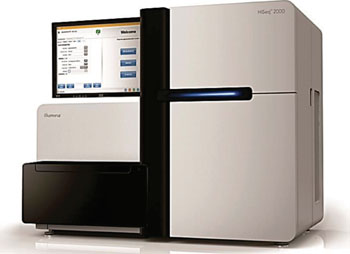Blood Test Detects Breast Cancer Metastasis Early
By LabMedica International staff writers
Posted on 04 Jun 2015
Cell‐free circulating tumor DNA (ctDNA) contains tumor‐specific chromosomal rearrangements that may be interrogated in blood plasma and used to detect metastatic breast cancer earlier. Posted on 04 Jun 2015
The chances of being cured of breast cancer have increased in recent decades, however if the tumor has metastasized, the disease remains essentially incurable. One reason for this could be that the metastases are detected late, after they have grown enough to cause symptoms or be seen on a radiological scan.

Image: The HiSeq 2000 sequencing system (Photo courtesy of the University of Queensland).
Clinical scientists at Lund University (Sweden) carried out a retrospective study of 20 patients diagnosed with primary breast cancer and long follow‐up. Primary tumor specimens were snap‐frozen immediately after surgery and stored at −80 °C. Blood samples were collected from patients in ethylenediaminetetraacetic acid (EDTA) tubes and were centrifuged to separate plasma from peripheral blood cells within two hours of collection, and the fractions were frozen at −80 °C. Total cell‐free circulating DNA was isolated from 0.5 mL of plasma using the QIAamp UltraSens Virus DNA kit (Qiagen; Venlo, The Netherland).
Whole‐genome paired‐end Illumina sequencing libraries were constructed from tumor DNA sheared to a median insert size of 500 bp sequenced on HiSeq 2000 instruments (Illumina; San Diego, CA, USA) and aligned to a human reference genome. The quantification of tumor‐specific rearrangements in plasma was done using droplet digital polymerase chain reaction (ddPCR) using a QX100 ddPCR instrument (Bio-Rad Laboratories; Hercules, CA, USA).
The tumor samples contained many genetic changes, which constituted a "fingerprint" specific to each tumor. The investigators then looked in the blood samples for circulating tumor DNA (ctDNA) with the same fingerprint. Although the study is fairly small as it is based on material from only 20 women, the results were striking. The metastases were also reflected in the blood samples at an early stage. There it was possible to find signs of the new tumors many months before hospital investigations revealed that the patients had suffered a relapse.
Lao Saal, MD, PhD, who led the study said, “For 19 of the 20 women, the ctDNA in the blood samples gave a clear indication of how things would turn out. The women who never got a relapse had no detectable ctDNA, whereas all women who had tumor DNA in their blood eventually had symptomatic relapses that were diagnosed in the clinic. The circulating tumor DNA values in the blood samples identified the metastases on average 11 months before they were diagnosed by standard clinical procedures. In some cases, the blood test detected the metastasis three years earlier. If we could find the cancer recurrences that much earlier, we might be able to treat them more successfully.” The study was published on May 18, 2015, in the journal EMBO Molecular Medicine.
Related Links:
Lund University
Qiagen
Illumina














